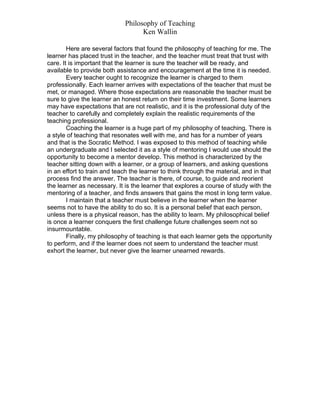Ken Wallin\'s Philosophy Of Teaching
- 1. Philosophy of Teaching Ken Wallin Here are several factors that found the philosophy of teaching for me. The learner has placed trust in the teacher, and the teacher must treat that trust with care. It is important that the learner is sure the teacher will be ready, and available to provide both assistance and encouragement at the time it is needed. Every teacher ought to recognize the learner is charged to them professionally. Each learner arrives with expectations of the teacher that must be met, or managed. Where those expectations are reasonable the teacher must be sure to give the learner an honest return on their time investment. Some learners may have expectations that are not realistic, and it is the professional duty of the teacher to carefully and completely explain the realistic requirements of the teaching professional. Coaching the learner is a huge part of my philosophy of teaching. There is a style of teaching that resonates well with me, and has for a number of years and that is the Socratic Method. I was exposed to this method of teaching while an undergraduate and I selected it as a style of mentoring I would use should the opportunity to become a mentor develop. This method is characterized by the teacher sitting down with a learner, or a group of learners, and asking questions in an effort to train and teach the learner to think through the material, and in that process find the answer. The teacher is there, of course, to guide and reorient the learner as necessary. It is the learner that explores a course of study with the mentoring of a teacher, and finds answers that gains the most in long term value. I maintain that a teacher must believe in the learner when the learner seems not to have the ability to do so. It is a personal belief that each person, unless there is a physical reason, has the ability to learn. My philosophical belief is once a learner conquers the first challenge future challenges seem not so insurmountable. Finally, my philosophy of teaching is that each learner gets the opportunity to perform, and if the learner does not seem to understand the teacher must exhort the learner, but never give the learner unearned rewards.

